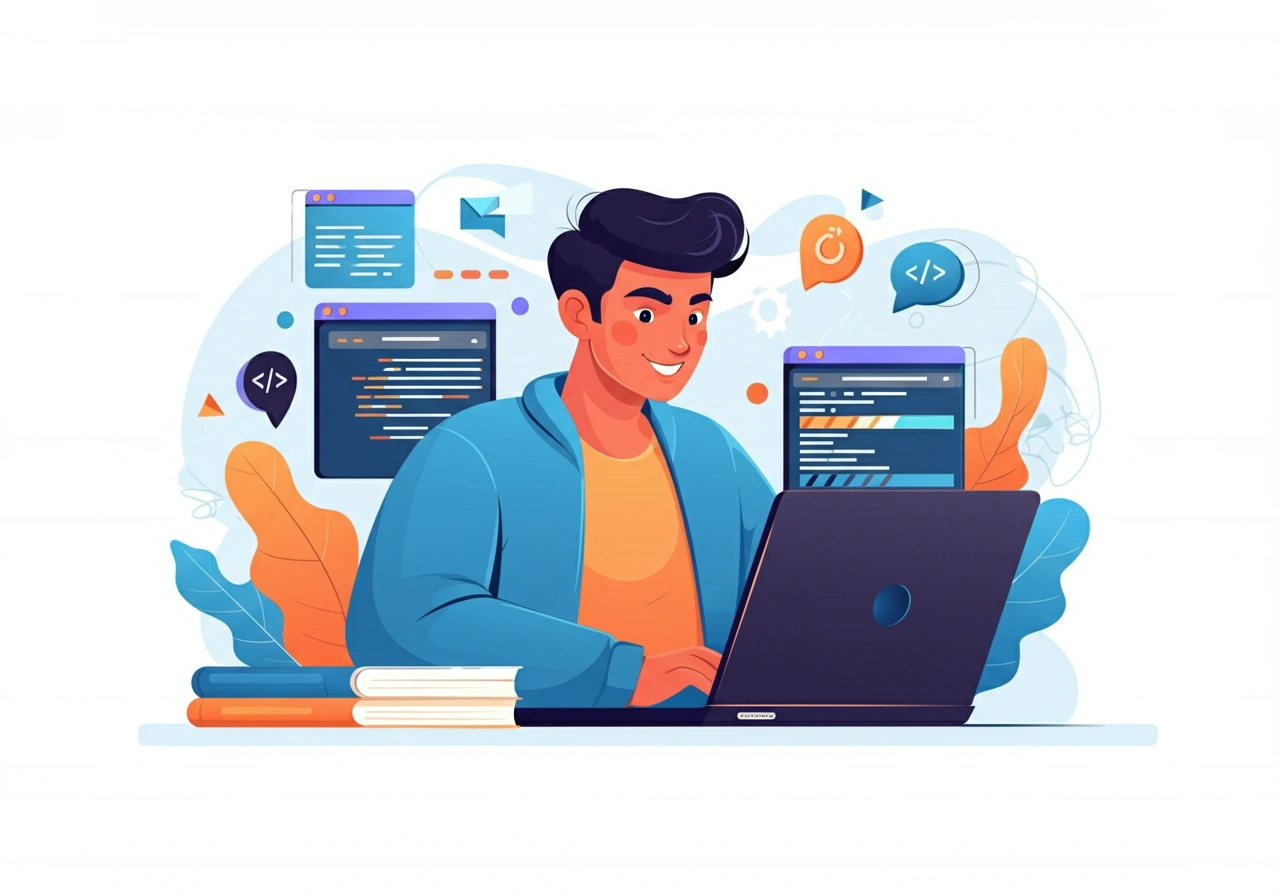The tech industry continues to grow at breakneck speed, creating thousands of new opportunities for skilled professionals. One path that’s gaining significant traction is becoming an apprenti software developer—a role that combines structured learning with real-world coding experience. Unlike traditional education routes, apprenticeships offer a practical, earn-while-you-learn approach that can fast-track your entry into the tech world.
If you’ve been considering a career in software development but aren’t sure about committing to a four-year degree, an apprenticeship might be exactly what you need. This guide will walk you through everything you need to know about this career path, from what the role entails to how you can land your first position.
What is an Apprenti Software Developer?
An apprenti software developer is someone who learns the craft of software development through a combination of on-the-job training and structured education. Think of it as an immersive learning experience where you work alongside experienced developers while building real applications for actual clients or products.
During a typical apprenticeship, you’ll spend your days writing code, debugging software, participating in team meetings, and contributing to genuine projects. You’re not just shadowing senior developers—you’re actively involved in the development process from day one. The apprenticeship typically lasts between one to two years, depending on the program and your prior experience.
Your responsibilities will grow as you progress. Early on, you might focus on simpler tasks like fixing bugs, writing tests, or building small features. As your skills develop, you’ll take on more complex challenges such as designing system architecture, leading feature development, or optimizing application performance.
Benefits of Becoming an Apprenti Software Developer
Hands-on experience stands out as the most compelling advantage. While computer science students spend years learning theory in classrooms, apprentices immediately apply their knowledge to real projects. You’ll encounter actual problems that customers face, learn to work within existing codebases, and understand how software development happens in professional settings.
Mentorship opportunities provide invaluable guidance throughout your journey. Most apprenticeship programs pair you with experienced developers who review your code, answer your questions, and help you navigate technical challenges. This relationship accelerates your learning far beyond what self-study or classroom education can offer. Your mentor becomes your advocate, helping you avoid common pitfalls and pointing you toward resources that match your learning style.
Career advancement happens naturally as you build your skills and professional network. Many companies hire their apprentices as full-time junior developers upon completion of the program. Even if your apprenticeship company doesn’t extend an offer, you’ll have substantial work experience that makes you attractive to other employers. You’re not graduating with just a certificate—you’re entering the job market with a portfolio of real projects and professional references.
How to Become an Apprenti Software Developer
Educational requirements are surprisingly flexible. While some programs prefer candidates with a high school diploma or GED, many don’t require a college degree. What matters most is demonstrating genuine interest in programming and showing that you can learn independently. Some apprenticeships accept complete beginners, while others expect basic programming knowledge.
Before applying, invest time in learning fundamental programming concepts. Take free online courses in languages like Python, JavaScript, or Java. Build small projects—a personal website, a simple game, or a calculator app. These projects don’t need to be complex, but they should demonstrate that you understand basic programming logic.
Available programs and resources vary widely across regions and specializations. Organizations like Apprenti, Microsoft LEAP, and various regional apprenticeship networks offer structured programs. Tech companies including Google, IBM, and Amazon run their own apprenticeship initiatives. Research what’s available in your area or consider remote apprenticeships that allow you to work from anywhere.
Skills Needed
Technical skills form the foundation of your apprenticeship. You’ll need to understand at least one programming language reasonably well. Most apprenticeships value proficiency in JavaScript, Python, or Java, as these languages power much of modern software. Beyond coding, familiarize yourself with version control systems like Git, which developers use to manage code changes and collaborate with teammates.
Database basics matter too. Learn how applications store and retrieve data using SQL or NoSQL databases. Understanding HTML and CSS helps if you’re interested in web development. You don’t need to master everything before starting—apprenticeships are designed to teach you—but basic familiarity makes the learning curve less steep.
Soft skills often determine success just as much as technical abilities. Communication ranks high because you’ll collaborate with team members, ask questions, and explain your work. Practice articulating technical concepts clearly, both in writing and conversation.
Problem-solving abilities help you tackle the inevitable bugs and challenges that arise during development. Cultivate patience and persistence—programming often involves trying multiple approaches before finding the right solution. Embrace feedback gracefully. Code reviews can feel intimidating at first, but they’re how you improve. View criticism as a learning opportunity rather than personal judgment.
Time management becomes crucial when balancing work responsibilities with continued learning. You’ll need to manage project deadlines while dedicating time to studying new concepts and technologies.
Challenges and How to Overcome Them
Imposter syndrome affects nearly every apprentice at some point. You might feel overwhelmed by how much experienced developers know, or worry that you’re not progressing fast enough. Remember that everyone started where you are. Your senior colleagues spent years building their expertise—you can’t expect to match their knowledge in months.
Combat these feelings by tracking your progress. Keep a journal of what you’ve learned each week. Review code you wrote three months ago and notice how much you’ve improved. Celebrate small wins, whether that’s fixing your first bug independently or successfully deploying a feature.
Steep learning curve challenges you constantly. New frameworks, tools, and best practices emerge regularly in software development. The field evolves rapidly, which can feel overwhelming. Focus on mastering fundamentals first rather than chasing every new trend. A strong understanding of core concepts allows you to adapt to new technologies more easily.
When stuck on a problem, follow the “15-minute rule”: try solving it yourself for 15 minutes, then ask for help. This approach balances independent problem-solving with efficient learning. You develop troubleshooting skills without wasting hours on issues a colleague could clarify in minutes.
Career Paths and Opportunities
Completing an apprenticeship opens multiple career trajectories. Most apprentices transition into junior developer roles, where they continue building features and gaining experience. From there, you might specialize in frontend development (building user interfaces), backend development (handling data and server logic), or full-stack development (doing both).
Specialization opportunities abound. You could focus on mobile app development, DevOps engineering, data engineering, or cybersecurity. Each path offers unique challenges and opportunities. Some developers move into technical leadership roles like team lead or engineering manager, while others prefer staying hands-on as senior or principal engineers.
The industry outlook remains strong. The Bureau of Labor Statistics projects software developer employment will grow 25% from 2022 to 2032—much faster than average for all occupations. Companies across every industry need software developers, from healthcare to finance to entertainment. This demand translates to competitive salaries, even for entry-level positions.
Resources and Programs
Apprenti operates across multiple U.S. states, connecting aspiring developers with technology companies. Their programs typically last 12 months and include both technical training and professional development.
Microsoft LEAP offers 16-week apprenticeships for people from non-traditional backgrounds. They focus on software engineering, with additional tracks for data analytics and other specializations.
Multiverse runs apprenticeships in partnership with major companies, combining on-the-job training with structured curriculum. They operate in both the U.S. and UK.
Techtonic Academy provides apprenticeships in Colorado, pairing students with local tech companies while they complete coursework.
Free learning platforms like freeCodeCamp, The Odin Project, and Codecademy offer comprehensive curricula that prepare you for apprenticeship applications. These resources teach programming fundamentals through hands-on projects.
Local community colleges often partner with regional employers to offer apprenticeship programs. Check with your nearest technical college about software development opportunities.
Start Your Journey Into Software Development
Becoming an apprenti software developer offers a practical, accessible path into the tech industry. You’ll gain real experience, earn while you learn, and build professional connections that support your long-term career. The journey requires dedication and persistence, but the rewards—both financial and personal—make it worthwhile.
Don’t wait for the “perfect” moment or worry about having every skill mastered. Start learning the basics, build a simple project or two, and begin researching apprenticeship programs in your area. The tech industry needs diverse perspectives and fresh talent. Your unique background and problem-solving approach bring value that complements technical skills.
Take the first step today. Pick a programming language, complete a beginner tutorial, and start building something—anything. Your career as a software developer begins with that first line of code.




